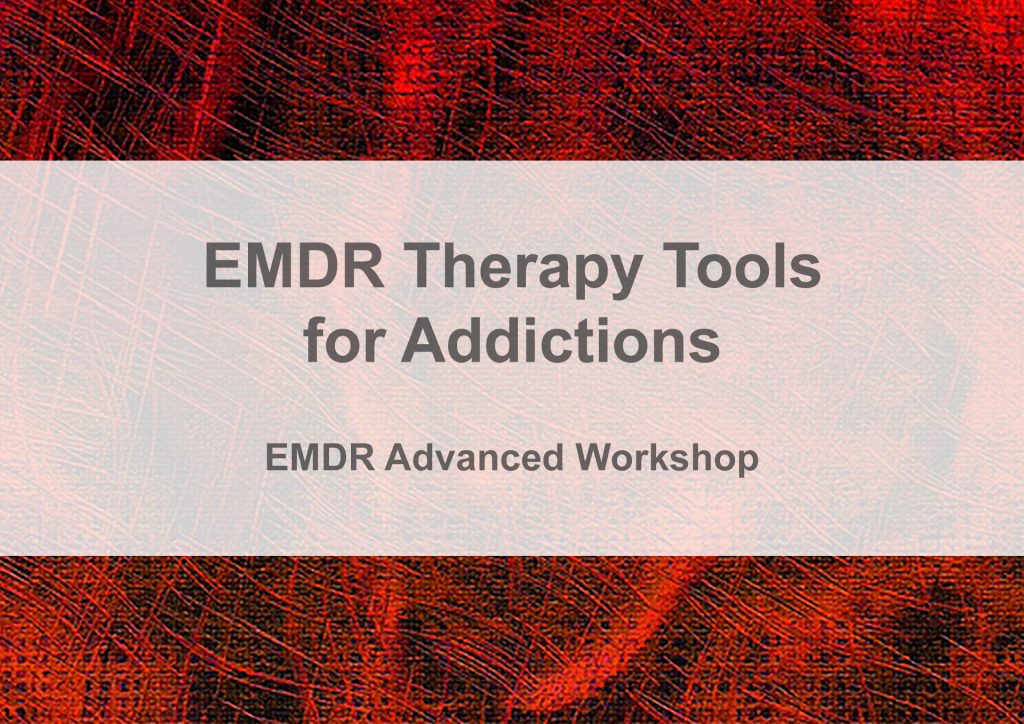This blog post is a collaboration between Barb Maiberger, MA, LPC and guest blogger John Gray, MA, LPC, CACIII. See below for information about their EMDR Advanced Workshop, “EMDR Therapy Tools for Addictions“

EMDR therapy is best known for helping people heal from traumatic events. The use of EMDR is expanding and helping more and more people with issues that are causing them distress in their lives. EMDR treatment for addictions is a good example.
Some turn to addiction when they experience discomfort or trauma in their lives. An addiction can be a way to emotionally numb memories or feelings that are difficult to tolerate such as emptiness, boredom, isolation, or alienation.
There are many kinds of addictions, such as alcoholism, drug or substance abuse, sex addiction, gambling addiction, eating disorders, just to name a few. No matter what type of addiction one is suffering from, the process of living with the addiction is complicated, and it impacts a person biologically, chemically, neurologically, psychologically, medically, emotionally, socially and spiritually.
There are different models that explain addictions and their functions; the most relevant addictions model for EMDR therapy is trauma based.
For example, the ACE study (Adverse Childhood Experience) shows that trauma in childhood can increase one’s risk of developing addictions later in life.
There are 10 factors in the ACE study:
- Emotional abuse
- physical abuse
- sexual abuse
- emotional neglect
- physical neglect
- mother treated violently
- household substance abuse
- household mental illness
- parental separation or divorce
- incarcerated household member
If subjects had five or more of ACE’s they were 7 to 10 times greater risk for substance abuse in their adulthood. This study shows that traumatic events have a significant impact on one’s life, especially as it related to addiction.
Therapists that work with substance abuse addiction have seen clients struggle with their relationship to the substance itself. The relationship the client has with the substance often times becomes the dominant relationship the client has in their life. This attachment is unhealthy and causes damage in other relationships in their lives (work, family, etc.).
What can be challenging in working with addictions are the barriers to treatment. These barriers can be financial, negative thinking, hanging with wrong crowd, or shame. Therapists need to help clients address these barriers for successful treatment to occur.
A successful EMDR treatment for addiction has to address the trauma that is driving the addictive behaviors. As the trauma is processed through EMDR, the addiction should lose its potency and the urge to use a substance should decreases as well, especially during trigger events.
Working with clients who are struggling with addictions can be challenging. Looking at addictions through the lens trauma can be a powerful tool in helping clients with their addictions.
About Guest Blogger John Gray, MA, LPC, CACIII

Related EMDR Trainings and EMDR Workshops
John Gray is a Certified EMDR Therapist and Consultant. John has fifteen years of experience as a psychotherapist. With his ten years of experience as a University Instructor of Sociology and Psychology, he brings a unique perspective to his work. His experience in how we develop a sense of self and maintain this sense of self through various methods of interaction forms the essence of his therapeutic approach. John strives to co-create a safe environment for all who choose to embark on the rewarding work involved in taking more control of their lives. He has presented at national and international conferences and continues to guest lecture at colleges and universities.
John Gray’s Website EMDR Therapist Directory Profile

“EMDR Therapy Tools for Addictions” taught by John Gray and Barb Maiberger explores addictions through the lens of trauma work. This training will deepen your awareness of interventions to use in the 8 Phase treatment model of EMDR. Experiential exercises are practiced so that new skills can be implemented immediately into one’s practice.
Learn More About “EMDR Therapy Tools for Addictions”





